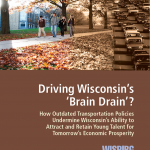Driving Wisconsin’s ‘Brain Drain’
How Outdated Transportation Policies Undermine Wisconsin’s Ability to Attract and Retain Young Talent for Tomorrow’s Economic Prosperity
How Outdated Transportation Policies Undermine Wisconsin’s Ability to Attract and Retain Young Talent for Tomorrow’s Economic Prosperity
Downloads
WISPIRG Foundation

Millennials are traveling in different ways than their parents did. Today’s youth are leading the decline in vehicle miles traveled while increasing how much they bike, walk, and take transit. Young people increasingly tell surveys that they want to live a lifestyle that isn’t dependent on driving, and they are drawn to the vibrancy and convenience of more walkable communities.
Many of today’s youth are postponing or avoiding what used to be a rite of passage – getting a car and a driver’s license. Mounting evidence suggests that Millennials, the most technologically “connected” and savvy of all generations, often prefer interacting with friends and family on their phones or checking social media while riding a bus or train to sitting behind the wheel in traffic.
State and federal policy makers, however, have done little to understand the changing transportation preferences of today’s youth and ensure that today’s transportation investments in Wisconsin will meet tomorrow’s needs.
To better understand how the availability of non-driving modes of transportation can retain and recruit young talent for Wisconsin, the WISPIRG Foundation surveyed 530 college students across Wisconsin. While the survey was not conducted with a scientifically selected sample, the results of our survey nonetheless illustrate that the Millennial generation is seeking a different transportation future than the spending priorities of state leaders. It underscores that transportation options may be a factor in decisions about where Millennials decide to locate in the future.
The key findings are:
- 60 percent of respondents said they would be at least “somewhat more likely” to stay in Wisconsin after graduation if they could live in a place where they could get around without driving. Of that group, a majority said the ability to live in places with transportation alternatives would make them “much more likely” to remain in Wisconsin. Only 23 percent of all respondents said that it would not make them more likely to stay in Wisconsin.
- 47 percent of all respondents said that living in a place after graduation where there are options other than driving is “very important.” An additional 35 percent said that having transportation options was “somewhat important” and only 14 percent said that it was “not important.” Thus, “very important” outscored “not important” by more than three-to-one.
- 84 percent of respondents said that it was either “very important” or “somewhat important” for them to have transportation options other than a car to get around. 56 percent said it was “very important” to have options other than a car, and only 10 percent said it was “not important.”
Ninety percent of our survey respondents said that they plan to own a car after graduation and nearly half of all respondents currently commute to school by car. As such, the survey respondents seem a typical cross-section of today’s youth. But, given the state’s emphasis on building new highways and its relative neglect of emerging transportation modes, such as transit and biking, the findings of our survey suggest that Wisconsin’s current transportation spending priorities, including recent cuts to transit funding, could undermine Wisconsin’s ability to attract and retain young talent.
WISPIRG Foundation urges state and federal leaders to:
- Increase funding for the transit, bike, and pedestrian infrastructure that more and more Millennials are demanding and gravitating towards,
- Save money by scaling back or cancelling unneeded highway expansion,
- Collect more data on the transportation preferences of young people, and
- Revisit past traffic growth projections for proposed highway expansion projects in light of recent trends in driving.
Out-of-touch and uninformed transportation policy decisions risk losing the opportunity to attract the young talent and educated workforce that are important to our economic prosperity in the future. Today’s policies and spending priorities need an update that considers these factors.

